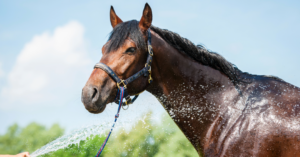
Beating the Heat: 6 Proven Ways to Keep Sport Horses Cool and Performing
With the arrival of warmer weather, the competition calendar gets…
Feed and products in 25kg bags excluded
Bank transfer | Paypal | Credit cards

The importance of nutrition in sport horses
Nutrition plays a key role in the performance, health, and overall well-being of sport horses. A poorly balanced diet can lead to loss of condition, reduced athletic output, and a higher risk of digestive and muscular disorders.
In this article, you’ll find key principles of feeding the sport horse, along with practical tips that are easy to implement in your daily routine. These are based on the latest research and guidelines from the National Research Council (NRC, 2007).
The Nutritional Needs of Sport Horses
Horses in regular training (5–6 sessions per week) require carefully tailored nutrition. Their needs depend on training intensity, age, physical condition, and environmental factors.
Daily guidelines for a 500 kg horse:
Energy: 20–25 Mcal/day (20,000–25,000 kcal)
Protein: 700–900 g/day
High-quality fiber to support gut health
Balanced vitamins and minerals, especially electrolytes (sodium, chloride, potassium)
Plenty of fresh, clean water at all times
👉 Need a personalized plan? Unika offers free nutritional consultations.
Hay: the Foundation of a Healthy Diet
Hay is the cornerstone of every horse’s diet, especially for those in sport. Yet, it’s often chosen without enough attention to quality.
A 500 kg horse should receive at least 1.5–2% of body weight in forage per day, or about 7.5–10 kg of hay daily.
Practical tips:
Choose clean, fragrant hay that’s free from dust and mold
Select fiber-rich hay with a good calcium-to-phosphorus ratio—like mixed grass hay or alfalfa blends
Offer hay freely throughout the day, or divide it into at least 3 feedings to avoid long gaps without food, which can lead to stomach issues
Horse feeds: Be Careful with Grain-Based Feeds
A common mistake is relying too heavily on concentrates rich in cereals—such as flaked feeds made mostly from corn, barley, or oats.
Risks of a high-grain diet:
Disrupted gut fermentation, which may lead to bloating, gas, and laminitis
Sudden blood sugar spikes that can cause nervous behavior
Systemic inflammation and muscle disorders like tying-up (also known as Monday morning disease) and muscle acidosis, which cause stiffness, fatigue, and pain
What to look for instead:
Choose feeds that are:
Low in starch and grains
High in digestible fiber, such as beet pulp, rice bran, and alfalfa
Rich in high-quality protein
Supplemented with healthy fats, such as rice bran or vegetable oils (flaxseed, soybean)
👉 Unika Sport is one example: low in starch, rich in fiber and protein, and designed specifically for athletic horses.
Electrolytes: Important All Year Round
Sport horses sweat a lot during training and competition, losing essential electrolytes such as:
Sodium (Na)
Chloride (Cl)
Potassium (K)
Even in cooler months, sweating during exercise can be significant. Electrolyte loss can lead to fatigue, cramps, reduced appetite, and muscle problems.
What you can do:
Supplement electrolytes daily, even in winter
Use high-quality, water-soluble products that are easily absorbed
Avoid using table salt alone—it’s not enough to meet your horse’s needs
👉 Try Elyte C+E: a blend of electrolytes with added vitamins C and E to support muscle balance and antioxidant function.
Protecting the Stomach
Many sport horses suffer from gastric issues, ranging from mild gastritis to ulcers. Common causes include:
Stress from transport or competition
Long fasting periods
High-cereal diets
Training on an empty stomach
How to prevent stomach problems:
Never train a horse on an empty stomach—offer a small amount of hay 30–60 minutes before exercise
Use natural gastroprotective supplements, such as those with licorice extract, which soothes and supports stomach lining repair
Always provide hay to avoid long gaps between meals
👉 Unika’s Gastrosan powder and Gastro Pellet are 100% natural solutions that help protect the gastric lining.
Daily feeding routine: a quick guide for sport horses
Here’s an ideal daily routine for a 500 kg sport horse:
🟢 Hay: 8–10 kg/day, always available or given in 3–4 meals
🟢 Feed: Low in cereals, high in fiber and healthy oils—customized to your horse’s needs
🟢 Electrolytes: Supplement daily, year-round
🟢 Gastroprotectants: Use regularly throughout the year
🟢 Water: Clean and fresh, available at all times
🟢 Avoid fasting: Never leave the horse without hay for more than 4–5 hours
Final thoughts
Feeding a sport horse properly isn’t just about energy—it’s an investment in long-term health, injury prevention, and peak performance. While each horse is unique, some fundamentals apply to all:
Always offer high-quality hay
Choose feeds formulated for equine athletes
Supplement strategically
Protect the stomach
Interested in a personalised free nutritional plan?
At Unika, we create personalized nutrition strategies for horses in every discipline. Get in touch for a free consultation and start optimizing your horse’s diet today.

With the arrival of warmer weather, the competition calendar gets…

The importance Assessing your horse’s physical condition and determining whether…

Is your horse in good shape? Assessing your horse’s physical…

If you have ever walked through the stables or along…

Colic is one of the most common and delicate issues in horse care.

Thanks to its anti-inflammatory, anti-oedemigenous and pain-relieving properties, it is perfect for protecting horses’ osteoarticular well-being.